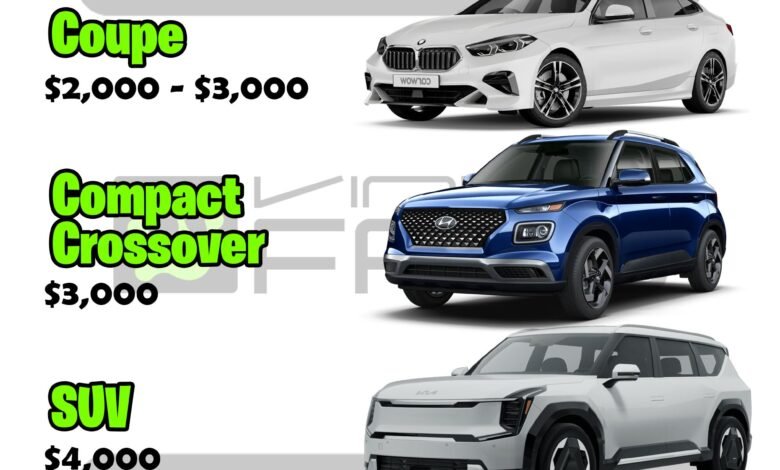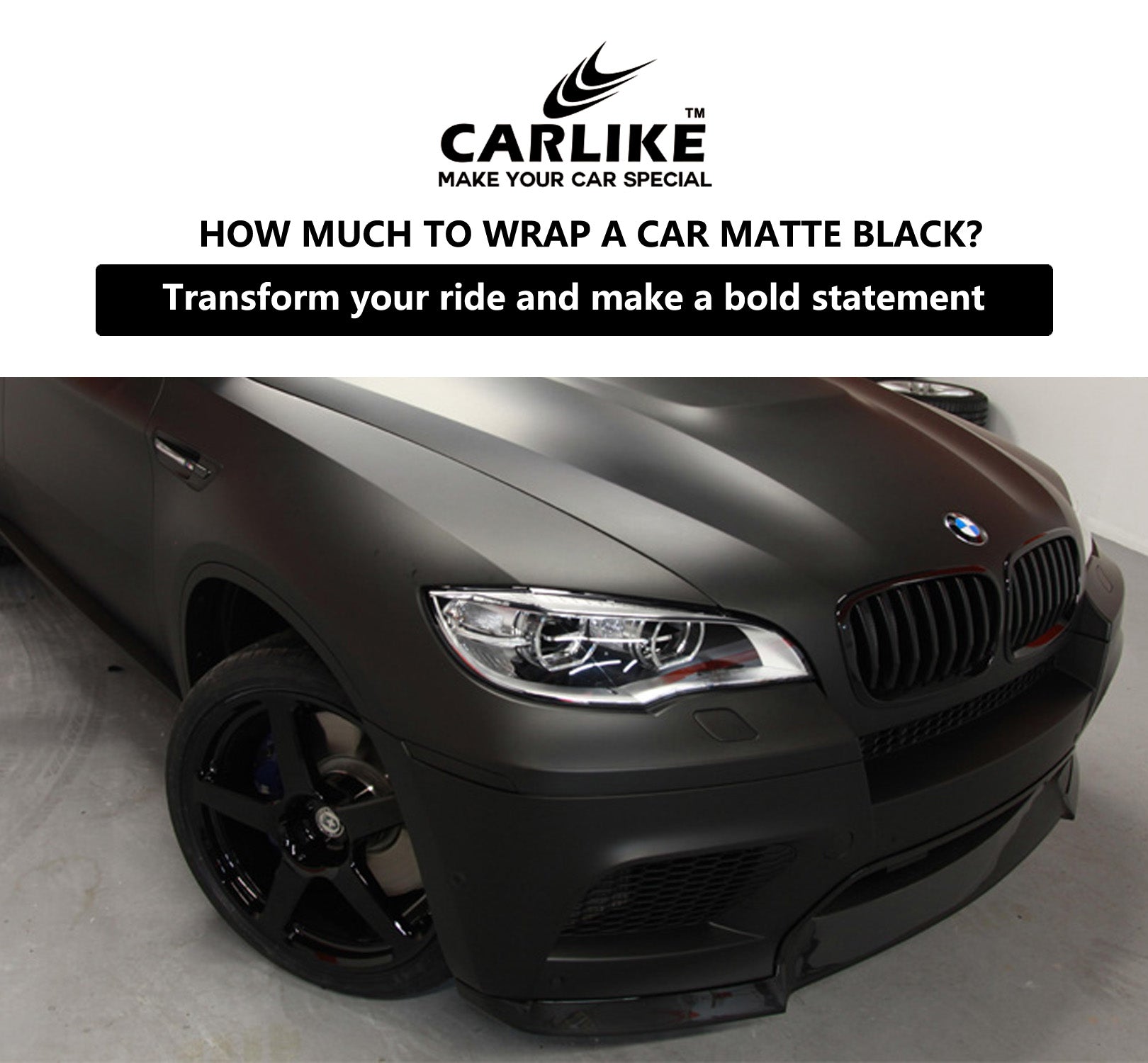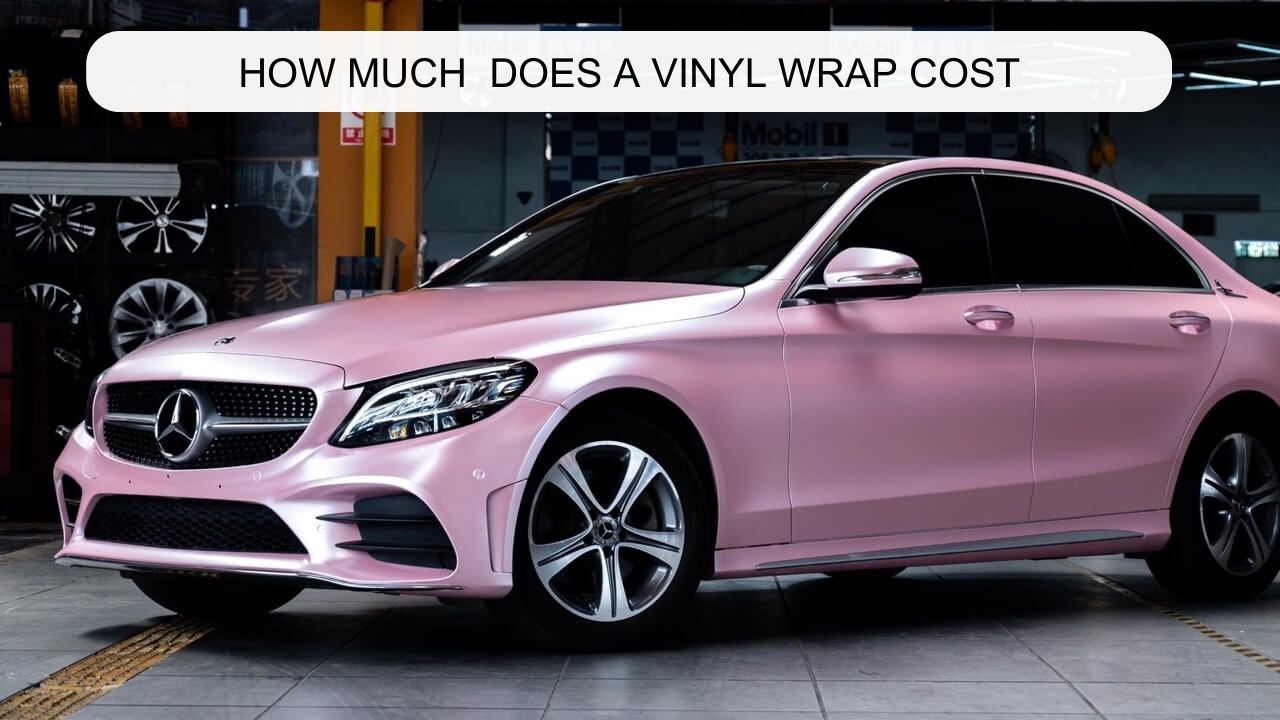How Much to Wrap a Car: Unveiling the Costs

To wrap a car, the cost typically ranges from $2,500 to $5,000 depending on the size, complexity, and type of wrap desired. Car wrapping involves applying a vinyl film to the vehicle’s surface, offering a protective layer and the ability to change its appearance.
This process requires professional installation and the use of high-quality materials to ensure a durable and long-lasting result. While the initial cost may seem significant, car wrapping can provide a cost-effective alternative to repainting and offers the flexibility to change the design whenever desired.
Additionally, the wrap acts as a safeguard against scratches, UV rays, and other potential damage to the vehicle’s paintwork. With proper care and maintenance, a wrapped car can retain its appearance for several years.
Introduction To Car Wrapping
Car wrapping costs vary based on the size and type of vehicle, ranging from $2,000 to $5,000. The price includes materials and labor for a complete wrap transformation. It’s a cost-effective way to refresh a car’s appearance and protect its original paint.
The Rise Of Car Wrapping
Car wrapping has gained popularity as a cost-effective way to change a vehicle’s appearance.
Benefits Of Wrapping Your Car
Car wrapping offers a protective layer, customization options, and easier maintenance.
Car wrapping, a trend on the rise, provides a versatile solution for vehicle customization. It involves applying a thin, adhesive vinyl film to the exterior of a car, transforming its appearance without the need for a permanent paint job. The rise of car wrapping can be attributed to its affordability and the wide range of design options available to car owners.
Factors Influencing Car Wrap Prices
How Much to Wrap a Car? Factors influencing car wrap prices include the size of the vehicle, the complexity of the design, the type of material used, the quality of the installation, and any additional customization options. These variables can significantly impact the overall cost of wrapping a car.
Car wrapping is an excellent way to protect and enhance the appearance of your vehicle. However, the cost of a car wrap can vary significantly based on several factors. Here are some of the key factors that can affect the price of a car wrap.
Material Quality And Types
The cost of a car wrap primarily depends on the type and quality of the material used. Vinyl is the most common material used for wrapping cars, and its cost can vary based on the quality and brand. High-quality vinyl is more expensive but lasts longer and provides better protection against scratches, fading, and weather damage. Another factor that influences the cost of a car wrap is the type of vinyl used. Matte and glossy finishes are the most popular options, but they can cost more than specialty finishes like chrome, metallic, or carbon fiber.
Vehicle Size And Complexity
The size and shape of your car can also affect the cost of a car wrap. Larger vehicles like SUVs, trucks, and vans require more vinyl material and take longer to wrap, which can increase the overall cost. Complexity is another factor that affects the price of a car wrap. If your vehicle has a lot of curves, contours, or tricky areas to wrap, it will take more time and effort, which can drive up the cost.
Design Intricacies
The design of your car wrap can also impact the price. Simple designs with minimal graphics or text are less expensive than complex designs with intricate patterns, detailed graphics, or custom artwork. Moreover, the number of colors used in the design can also affect the price. The more colors you use, the more expensive the wrap will be. Overall, car wrapping prices can vary significantly based on different factors. It’s essential to discuss your requirements with a professional car wrapping company to get an accurate quote for your vehicle.
Cost Breakdown Of Car Wrapping
Car wrapping costs vary based on the size and type of vehicle, as well as the complexity of the design. Typically, a full car wrap can cost between $2,000 to $5,000, while a partial wrap may range from $500 to $2,000.
Additional features like window and roof wraps can also impact the overall cost.
Average Price Ranges
Car wrapping is an effective way to change the appearance of your vehicle while also protecting its original paint. However, the cost of car wrapping can vary depending on several factors. Here, we will break down the average price ranges to give you a better idea of what to expect. When it comes to car wrapping, the price can range anywhere from $500 to $5000. This wide range is due to factors such as the size of the vehicle, the complexity of the design, the type of vinyl used, and the experience and reputation of the installer. To give you a better idea, here is a breakdown of the average price ranges for different types of vehicles:
| Vehicle Type | Average Price Range |
|---|---|
| Sedan | $1500 – $3000 |
| SUV | $2000 – $4000 |
| Truck | $2500 – $5000 |
These price ranges are just estimates and can vary depending on the specific requirements of your vehicle. It is always recommended to get quotes from multiple car wrapping professionals to ensure you are getting the best price for the desired quality.
Partial Wrap Vs. Full Wrap Expenses
When considering car wrapping, you have the option to choose between a partial wrap or a full wrap. Each option comes with its own set of expenses. A partial wrap involves wrapping only certain areas of the vehicle, such as the hood, roof, or side panels. This option is more cost-effective and can range from $500 to $2500, depending on the size and complexity of the selected areas.
On the other hand, a full wrap covers the entire vehicle, providing a complete transformation. Full wraps require more material and labor, resulting in higher costs. The price for a full wrap can range from $2000 to $5000, depending on the factors mentioned earlier. It’s important to note that these price ranges are approximate and can vary based on individual circumstances and location. To get an accurate cost breakdown for your specific vehicle and desired design, it is advisable to consult with professional car wrapping companies in your area.
Remember, while the cost of car wrapping may seem high, it is a worthwhile investment that can protect your vehicle’s original paint and give it a fresh, personalized look. By understanding the average price ranges and the differences between partial and full wraps, you can make an informed decision that suits your budget and style preferences.

Credit: www.reddit.com
Diy Car Wrap Vs. Professional Services
When deciding to wrap your car, one of the first questions you may have is whether to do it yourself or hire a professional. Both options have their pros and cons, and it ultimately comes down to your budget, skill level, and desired outcome.
Materials And Tools Needed For Diy
If you decide to go the DIY route, you’ll need a few essential materials and tools to get started:
| Materials | Tools |
| – Vinyl wrap | – Heat gun |
| – Squeegee | – Razor blades |
| – Cleaning solution | – Cutting mat |
| – Adhesive promoter | – Knifeless tape |
Keep in mind that the quality of the materials you use can greatly affect the outcome of your DIY wrap. Cheaper vinyl may not adhere properly or may not last as long as higher quality vinyl.
Why Choose Professional Installation
While DIY may seem like a cost-effective option, it’s important to consider the potential risks and drawbacks. Without proper training and experience, you could end up damaging your car’s paint or creating an uneven and unprofessional-looking wrap.
Professional installation offers a range of benefits, including:
- Expertise: Professional installers have the experience and knowledge to ensure a flawless and long-lasting wrap.
- High-quality materials: Professionals use top-of-the-line vinyl and adhesives to ensure the best possible outcome.
- Time-saving: A professional installation can be completed much faster than a DIY project, leaving you with more time to enjoy your newly wrapped car.
- Warranty: Most professional installations come with a warranty, giving you peace of mind and protection against any potential issues.
Ultimately, the decision between DIY and professional installation depends on your priorities and budget. While DIY may seem like a cost-effective option, it’s important to consider the potential risks and drawbacks. Professional installation may cost more upfront, but it can save you time, stress, and money in the long run.
Duration And Longevity Of Car Wraps
Car wraps are a cost-effective way to give your vehicle a fresh, eye-catching look. However, it’s essential to understand the duration and longevity of car wraps before investing in this form of vehicle customization. Let’s delve into the expected lifespan of a car wrap and the maintenance required to prolong its life.
Expected Lifespan Of A Wrap
Car wraps are designed to be durable, with an expected lifespan of five to seven years for high-quality vinyl wraps. The actual lifespan can vary depending on factors such as exposure to harsh weather conditions and the quality of the installation. However, with proper care and maintenance, a well-installed car wrap can exceed its expected lifespan.
Maintenance To Extend Wrap Life
Regular cleaning is essential to extend the lifespan of a car wrap. Use a mild detergent and a soft cloth to clean the wrap, avoiding abrasive cleaners that could damage the vinyl. Additionally, parking in shaded areas or using a garage can help protect the wrap from prolonged exposure to UV rays, thereby prolonging its vibrant appearance.
Potential Additional Costs
When getting your car wrapped, it’s important to consider the potential additional costs that may arise. These costs can vary depending on the specific requirements of your project. Here are a few factors that can contribute to the overall cost of wrapping your car:
Design Services
Before wrapping your car, you may need design services to create a custom design that suits your preferences. Design services can include creating a logo, selecting colors, and designing graphics that will be applied to your vehicle. The cost of design services can range from $100 to $500, depending on the complexity and expertise required.
Complexity Surcharges
In some cases, the complexity of your car’s shape or surface may require additional effort from the wrapping professionals. This can result in complexity surcharges being added to the overall cost. For instance, if your car has intricate curves, contours, or challenging areas to wrap, the professionals may need to spend more time and use specialized techniques to ensure a seamless finish. Complexity surcharges typically range from $100 to $500, depending on the difficulty level of the project.
Repairs And Touch-ups
Prior to wrapping your car, it’s essential to ensure that the vehicle’s surface is in good condition. If there are any dents, scratches, or imperfections, these may need to be repaired or touched up before the wrapping process can begin. The cost of repairs and touch-ups will depend on the extent of the damage and the materials needed. It’s crucial to address any necessary repairs beforehand to achieve the best results and avoid compromising the longevity of the wrap.
In summary, when considering the cost of wrapping your car, it’s important to factor in potential additional costs. These can include design services, complexity surcharges, and repairs or touch-ups. By understanding these potential expenses, you can better prepare for the overall investment required for a successful car wrap.
Cost Comparison: Wrapping Vs. Painting
Wrapping a car is a cost-effective way to change its appearance. On average, it costs around $2,500 to $5,000 to wrap a car, while painting can cost up to $10,000. Plus, car wraps can protect the paint from scratches and UV damage.
When considering a car makeover, it’s crucial to weigh the costs of wrapping versus painting. Let’s delve into the cost comparison to help you make an informed decision.
Pros And Cons Of Wrapping
- Pros: Custom designs, easy removal, protects original paint.
- Cons: Can be pricey, limited lifespan, may not suit all car finishes.
Pros And Cons Of Painting
- Pros: Durable, seamless finish, color options unlimited.
- Cons: Expensive, time-consuming, difficult to change color.
Long-term Cost-effectiveness
| Wrapping | Painting | |
|---|---|---|
| Initial Cost | Lower | Higher |
| Maintenance | Less | More |
| Durability | Shorter lifespan | Longer lifespan |

Credit: carlikewrap.com
Maximizing Your Investment
Choosing The Right Wrap Shop
Look for experienced shops with a proven track record.
Ask for portfolio and customer reviews before deciding.
Understanding Warranties And Guarantees
Ensure the shop offers a warranty for their work.
Check what the warranty covers and its duration.
Comparing prices is crucial to get the best value.
Quality materials are essential for a long-lasting wrap.
Investing in professional installation ensures a flawless finish.
Real-life Examples
Case Studies Of Car Wrap Projects
Testimonials And Owner Experiences
- Owner A: “Car wrap increased brand visibility.”
- Owner B: “Received more inquiries after the wrap.”

Credit: www.carlawrap.com
Frequently Asked Questions
How Much Does It Cost To Wrap A Car?
Car wrapping costs vary depending on the size and complexity of the vehicle. On average, a full car wrap can cost between $2,000 and $5,000. Factors such as the type of vinyl used, design complexity, and labor also influence the total cost.
Is Car Wrapping A Good Investment?
Yes, car wrapping is a cost-effective way to change your vehicle’s appearance. It not only protects the original paint but also allows for customization. Additionally, it can enhance the resale value of your car by preserving its exterior in pristine condition.
How Long Does A Car Wrap Last?
With proper maintenance and care, a high-quality car wrap can last up to 7 years. Regular cleaning and avoiding harsh chemicals or abrasives will help maintain the wrap’s appearance and durability. However, environmental factors and sun exposure can affect its longevity.
Can You Wrap A Leased Car?
Yes, you can wrap a leased car as long as you remove the wrap before returning it. Ensure that the wrap does not damage the original paint and consult the lease agreement for any specific restrictions. Car wrapping provides a temporary customization option for leased vehicles.
Conclusion
The cost of wrapping a car varies based on factors such as the size of the vehicle and the type of vinyl used. It’s essential to consider the quality of the materials and the expertise of the installer. By understanding these factors, you can make an informed decision that aligns with your budget and aesthetic preferences.





